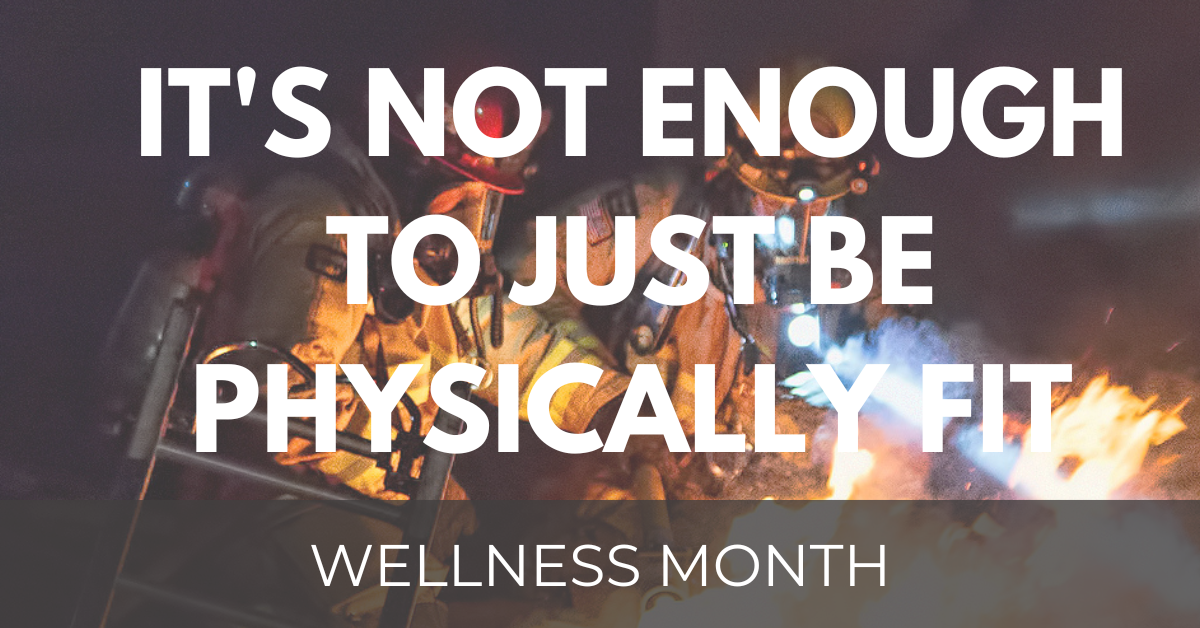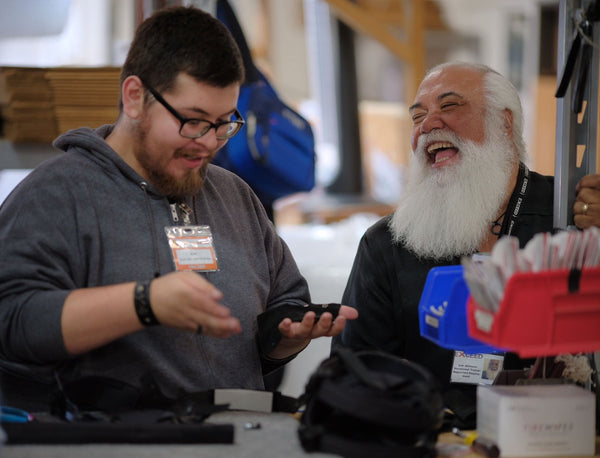It's Not Enough to Just Be Physically Fit | Wellness

First responders are the witnesses to the worst days of people's lives. When so much is at stake, fitness has never been more important. It's not enough to just be physically fit. When people are at their worst, they need you at your best - not only physically but mentally.
August is Wellness Month. From getting adequate sleep to nutrition, there are many factors that can affect our physical and mental wellbeing.
ERGONOMICS

SPRAINS, STRAINS, AND MUSCULAR PAIN ARE THE MOST PREVALENT INJURY TYPES INCURRED BY FIREFIGHTERS
What dangers do firefighters face on the job?
- Direct contact with fire
- Direct contact with and handling of hazardous chemicals
- Encountering excessive heat
- Responding to and from incidents
- Repetitive need to lift significant amounts of weight
- Emergency care often requires awkward positions
- Providing care in the field requires sustained positions in bending or leaning positions
What can I do to prevent injuries on the job?
Quality personal protective equipment will not only save your life but improve your quality of life long-term. Protective clothing and equipment reduces mobility, agility, dexterity, and coordination. Additionally, your mobility, strength, and endurance can be seriously compromised by the weight and bulk added to you.
The First Due has been trusted by departments for 50 years and is highly regarded as the tradition of the west. 50 years ago, Phenix founders, fire captains Ray Russell and Ronny Coleman, found themselves frustrated by the equipment available to them at the time. They wanted to create a helmet that was comfortable, light, and ergonomic in design.
The First Due is the all-risk helmet and available in multiple configurations to fit whatever emergency call you may face. It is lightweight and ergonomically designed to reduce the extreme neck fatigue that many face while on long calls. The safest helmet is the one you keep on your head.
With Phenix's unique suspension design, all of our helmets are able to be uniquely adjusted both vertically and horizontally ensuring the perfect fit every time. Our suspensions are interchangeable to every Phenix helmet and every part of the helmet can be easily taken apart with no tools necessary.
Interested in learning more? Read more here or contact us.
ADEQUATE SLEEP
The average adult requires anywhere from 6 to 10 hours of sleep each day.
| Age Range | Recommended Hours of Sleep | |
| Newborn | 0-3 months old | 14-17 hours |
| Infant | 4-11 months old | 12-15 hours |
| Toddler | 1-2 years old | 11-14 hours |
| Preschool | 3-5 years old | 10-13 hours |
| School-age | 6-13 years old | 9-11 hours |
| Teen | 14-17 years old | 8-10 hours |
| Young Adult | 18-25 years old | 7-9 hours |
| Adult | 26-64 years old | 7-9 hours |
| Older Adult | 65 years or older | 7-8 hours |
Sleep quantity is not that only part that matters - quality sleep matters. It's possible to get the hours of sleep you need and not feel refreshed because your sleep is fragmented or non-restorative.
Long wake periods, such as working longer than a typical 8 hour shift can impair performance. In fact, being awake for 15 hours straight decreases your performance as much as if your blood alcohol level were .05% - the legal limit is .08%; and being awake for 24 hours produces impairment equivalent to a blood alcohol level of .10% - .2% above the legal limit.
When you have a full night's rest, your level of alertness is restored to near-normal levels immediately upon awakening. Failure to have sufficient sleep has a detrimental effect on alertness and performance over time that increases linearly with sleep loss. Chronic sleep loss can result in decreased ability to think clearly, handle complex mental tasks, form new memories, and solve problems.
The average firefighter gets 5.6 hours of sleep with their sleep being interrupted an average 1.9 times. Failure to get adequate, restful sleep can have long-term effects on your health and impact your performance.
What happens if you don't get enough sleep?
- Lack of alertness
- Excessive daytime sleepiness
- Impaired memory
- Relationship stress
- Quality of life
What are the long-term risks of sleep deprivation?
- high blood pressure
- diabetes
- heart attack
- heart failure
- stroke
- obesity
- depression
- reduced immune system function
- lower sex drive
How can I get better sleep?
- Pay attention to your diet. Don't go to bed hungry or too full. Avoid heavy meals within a couple hours of bedtime. Nicotine, caffeine, and alcohol should be avoided as the stimulant effects can take hours to wear off and interfere with you sleep
- Create a relaxing space. Your room show be cool, dark, and quiet. Light exposure may make it more difficult to fall asleep. Avoid the use of back-lit screens just before bedtime.
- Include physical activity in your daily routine. Regular physical activity promotes better sleep, but be careful about being too active before bedtime. Spending time outside every day may help you sleep better, too.
MENTAL HEALTH
When it comes to health, many people think of physical fitness and neglect to address their mental wellness. 3 OUT OF 5 will not seek mental or emotional help because of the stigma within the fire service while 2 OUT OF 3 have never had enough time to recover between traumatic events.
 |
 |

|
50%OF FIREFIGHTER DEATHS ARE DUE TO STRESS AND EXHAUSTION |
THERE IS A FEAR OF BEING"unfit for duty" or seen as "weak"BY PEERS IF MENTAL HEALTH HELP IS SOUGHT |
FIRST RESPONDERS CONTEMPLATE SUICIDE AT A RATE10xHIGHER THAN THE AVERAGE AMERICAN ADULT |
What impacts firefighter mental health?
- Joining the emergency services at a young age
- Competing priorities of trying to balance daily schedules, family and work life, unexpected calls, and unplanned events
- Significant life events - these can be both positive and negative, like a birth or death in the family, or getting promoted or laid off from work
- Physical pain that hampers performance
- Shift changes or sleep disturbances
- Loss and grief, experiencing a series of events back-to-back or close calls
- Holding a supervisory rank
How can you remove the stigma surrounding mental health?
- Set the example. Acknowledge and talk about how you're feeling after a tough call. Seek help when needed and listen when someone shares with you.
- Create support amongst your peers. If possible, select those who are widely trusted to be the go-to person when someone needs to talk. Provide the team with training to handle issues that may arise and know the signs when someone needs help.
- Go to a professional. Find someone who is experienced with first responders.
- Make resources easily accessible. Display information for support groups, hotlines, and warning signs. Make it widely known.

Elliot, MD, FACP, FACSM, Diane L., et al. “The Effects of Sleep Deprivation on Fire Fighters and EMS Responders.” International Fire Chiefs Association, 2006, pp. 1–58, www.iafc.org/docs/default-source/1safehealthshs/progssleep_sleepdeprivationreport.pdf?sfvrsn=f9e4da0d_2.
“Here’s What Happens When You Don’t Get Enough Sleep (and How Much You Really Need a Night).” Cleveland Clinic, 25 Mar. 2022, health.clevelandclinic.org/happens-body-dont-get-enough-sleep/#:~:text=Some%20of%20the%20most%20serious,function%20and%20lower%20sex%20drive.
Ruderman Foundation. “Ruderman White Paper on Mental Health and Suicide of First Responders.” Ruderman Family Foundation, 10 Apr. 2018, rudermanfoundation.org/white_papers/police-officers-and-firefighters-are-more-likely-to-die-by-suicide-than-in-line-of-duty.
“Sleep Tips: 6 Steps to Better Sleep.” Mayo Clinic, 7 May 2022, www.mayoclinic.org/healthy-lifestyle/adult-health/in-depth/sleep/art-20048379?reDate=02082022.
Substance Abuse and Mental Health Services Administration. “First Responders: Behavioral Health Concerns, Emergency Response, and Trauma.” Disaster Technical Assistance Center Supplemental Research Bulletin, 2018, pp. 1–15, www.samhsa.gov/sites/default/files/dtac/supplementalresearchbulletin-firstresponders-may2018.pdf.
Suni, Eric. “How Much Sleep Do We Really Need?” Sleep Foundation, 13 Apr. 2022, www.sleepfoundation.org/how-sleep-works/how-much-sleep-do-we-really-need#:~:text=National%20Sleep%20Foundation%20guidelines1,to%208%20hours%20per%20night.
United States Fire Administration and Homeland Security. “Firefighter Suicide Reporting.” Fiscal Year 2021 Report to Congress, 2021, pp. 1–12, www.dhs.gov/sites/default/files/2022-01/FEMA%20-%20Firefighter%20Suicide%20Reporting%20%281%29.pdf.
Dejar un comentario
Ver artículo completo



